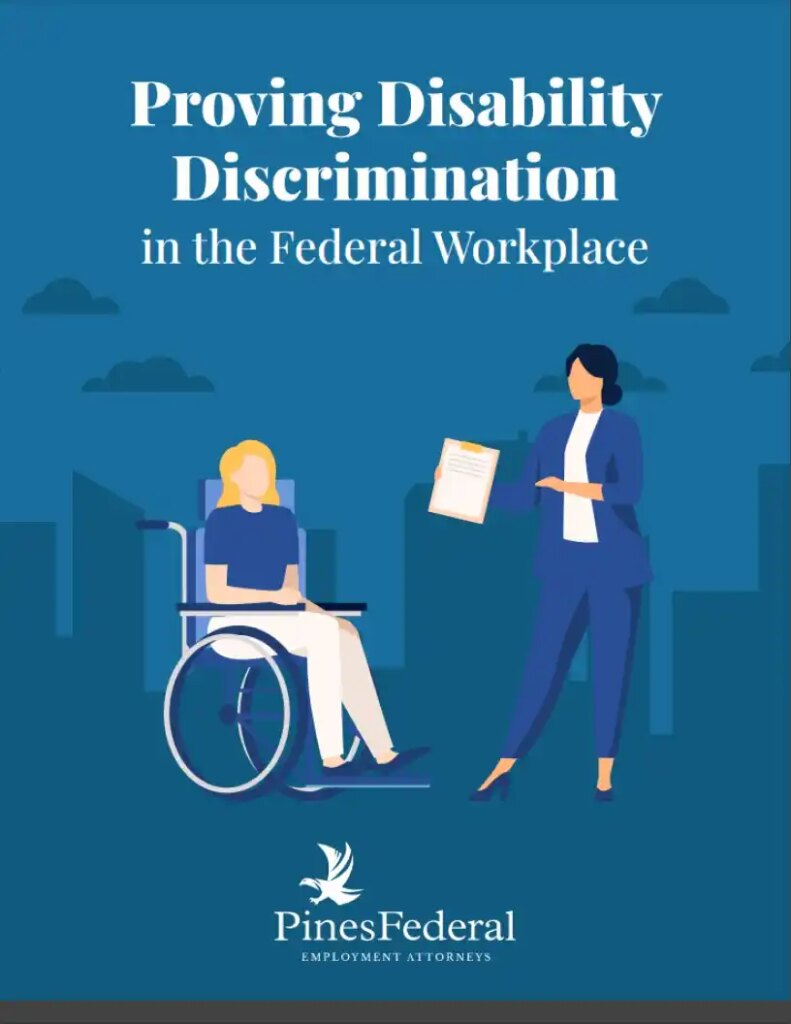FERS / CSRS Disability Attorneys Serving Federal Employees
Are you a federal employee living with a disability? You have a right to reasonable accommodation or reassignment to duties that can be performed in your condition as well as fair disability benefits.
At Pines Federal, our federal disability retirement attorneys are passionate about protecting the rights of federal employees in disability claims. Each case is unique, and our extensive knowledge of federal employee rights in disability cases has benefited hundreds of employees.
If you are limited at work by an injury or illness, you likely feel intimidated maneuvering through the maze of federal employment disability rules and regulations.
Even the seemingly simple step of determining whether you are, in fact, disabled is often a complicated legal determination. The good news is that the laws that govern this area are actually on your side and we can help protect your rights.
At Pines Federal, our employment lawyers are passionate about protecting the rights of federal employees in disability claims. Each case is unique, and our extensive knowledge of employee rights in disability cases has benefited hundreds of federal employees.
If you are a federal employee with physical or mental limitations, contact Pines Federal online or call (800) 801-0598 to discuss your options.
Helping You Understand Your Eligibility for Disability Benefits Under the Federal Employees Retirement System (FERS)
FERS is the most common retirement plan for federal employees. Although a few employees are covered under FERS’s predecessor, the Civil Service Retirement System (CSRS), CSRS applies only if you were in the federal service before 1987.
One of the major benefits of FERS is its disability benefits.
You are eligible for FERS disability benefits if you have:
- Been in the federal service for at least 18 months;
- Become disabled due to a mental or physical condition that prevents you from performing the core duties of your jobs; and
- Applied for disability benefits with the Social Security Administration (SSA).
Finally, the expected duration of your disability must be at least one year. A disability lawyer can help you check whether you are eligible for FERS disability benefits. But how do you know if you have a disability?
What Is Considered A Disability?

The Americans with Disabilities Act (ADA), which Congress passed in 1990, provided a basic definition for a “disability.” Specifically, the ADA-based definition of disability is “physical or mental impairment that substantially limits major life activities.”
Major life activities refer to functions like caring for yourself, walking, seeing, hearing, speaking, learning, and working. As you can imagine, this means that a wide range of conditions constitutes a “disability.”
Furthermore, while the ADA does not specifically list conditions that qualify as a disability, it does categorize them into the following:
- Physiological disorders
- Neurological disorders
- Psychological disorders
Having cancer, epilepsy or intellectual disability can qualify as an impairment that limits a major life activity as well.
After Congress passed the ADA, there was some controversy regarding whether certain minor conditions constituted “disabilities.”
Consequently, President George W. Bush signed the ADA Amendments Act (ADAAA), which emphasized that the “definition of disability should be construed in favor of broad coverage of individuals” to the maximum extent possible. The ADAAA thus makes it much easier for federal employees to establish that they have a disability.
What Is Disability Discrimination?
There are actually two kinds of disability discrimination. The first one is called disparate treatment. You are the victim of this type of disability discrimination when your employer uses your impairment to treat you in an adverse manner.
Additionally, this adverse manner is different from the treatment accorded to other similarly situated employees without the impairment or disability. Disability discrimination can take many different forms in the federal workplace.
Here are a few examples:
- Facing termination or demotion because your boss thinks your disability prevents you from doing your job;
- Receiving less pay for your work because your manager believes that you do the work more slowly than other workers;
- Being forced to transfer to another position without notice because management thinks your disability makes your co-workers uncomfortable; and
- Being denied job benefits or perks because the agency thinks that people with disabilities “don’t need those perks anyway.”
Having an impairment should not be an excuse to refuse to hire or promote you, pay you less money, or deny you benefits offered to other non-impaired workers.
It is also discrimination to suffer from emotional or physical harassment based on your disability, whether the behavior comes from a co-worker, supervisor, a non-employee or a customer. Note that you might not have a viable complaint based only on a few incidents or casual comments.
To qualify as illegal harassment, the conduct must have created an offensive or hostile working environment.
Conduct that may suffice to create a hostile working environment includes:
- Consistently hearing offensive names, jokes, or slurs related to your condition;
- Receiving threats because of your disability; and
- Being physically assaulted.
If you report the harassment and face an adverse employment decision due to your reporting, it also may constitute an act of disability discrimination. It may also affect your ability to receive retirement benefits. Contact a FERS disability lawyer today for more information.
What Laws Prohibit Disability Discrimination?
As any qualified disability lawyer can tell you, several significant laws work together to define and defend the liberties of Americans with disabilities. The first law is the Rehabilitation Act of 1973.
The Rehabilitation Act prohibited discrimination against disabled persons in federal agencies generally. The Rehabilitation Act also prevented the government from discriminating against individuals with disabilities in any federal program or activity.
Almost two decades later, the ADA extended the prohibition against disability discrimination to state and local governments, public accommodations, and most private-sector businesses.

“Pines Federal was exactly what I needed to guide and advise me through a very complicated process. Having their expert advice throughout my case was invaluable… I highly recommend Eric Pines and his firm to all who need a solid advocate as their legal guide.”
We Handle All Aspects Of Federal Disability Representation

Representing individuals with disabilities in the federal government is our specialty and passion! A federal disability attorney with our firm understands the intricacies of federal rules and regulations. We can help you with your EEO office and labor relations specialists.
There are few firms that specialize in the nuances of all these areas. At our firm, our employee disability attorneys pride ourselves on understanding all of these areas. We regularly help employees determine the best route to pursue.
We can help you with employment matters related to:
- Disability Discrimination
- Social Security Disability
- Federal Workers’ Compensation
- Federal Disability Retirement Benefits
At Pines Federal, we recommend a flat fee case review to our clients to help them determine the best path forward. After a case review, a client can decide if they would like to retain our firm to represent them.
Litigation, Mediation & Consulting
Our firm is well versed in this area. Mr. Pines has provided numerous training seminars in EEO and Reasonable Accommodation to the Veterans Administration, the Army, the Library of Congress and other federal agencies.
Mr. Pines is also a skilled FERS disability attorney with many years of experience. We can help you with informal and formal complaints and all aspects of litigation of EEO claims in federal administrative courts.
Check Out Our “Disability Inclusion in the Workplace” Series
For unique insights from successful business leaders, see attorney Eric Pines’s interview series “Disability Inclusion in the Workplace” on Medium.
“I am hopeful and optimistic that by raising consciousness around inclusion, equity, and diversity in all its forms, combined with the significant digital and technological advancements going on in our world today, we can provide a catalyst for change.”
Read more: Kristine Welker Of The Muscular Dystrophy Association On How Businesses Make Accommodations For Customers and Employees Who Have a Disability
Contact Pines Federal for Employment Disability Assistance Today!
Consult a disability retirement lawyer at Pines Federal today. Our attorneys focus exclusively on the rights of federal employees, labor unions, and agencies. We have over 60 years of collective experience in advising and pursuing disability discrimination claims for employees.
Call us at (800) 801-0598 or fill out our short form to set up an evaluation with our federal employee disability lawyers today.
[DOWNLOAD] Proving Disability Discrimination in the Federal Workplace

Find a Federal Disability Lawyer Near You
- The Best EEO Attorneys in Houston
- The Best OPM Disability Retirement Attorneys in Atlanta
- The Best OPM Disability Retirement Attorneys in Houston
- The Best OPM Disability Retirement Attorneys in Washington DC



